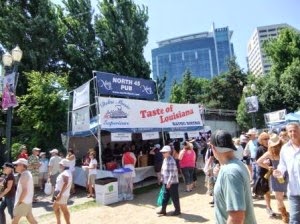 |
| Portland, Oregon captures the Taste of Louisiana food yet ranks much higher than Louisiana in quality of life |
While state government politicians and big oil money folks talk about the need for money, where does it go if the quality of life is impaired and there has been so much money produced from oil and gas.
The Annie E. Casey Foundation was the one that ranked Louisiana 49th among states in overall child well-being. It looks at a number of factors that include children's health, economic status, family structure and education. and the.
At the time Judy Watts, President/CEO of Agenda for children said, “It is truly disheartening to see Louisiana ranked 49th in the KIDS COUNT Data Book for the ninth straight year,” “For far too long, Louisiana’s high poverty rate has been the root cause of Louisiana’s poor rankings on many of these indicators. With many Louisiana families suffering from the effects of the recession and the recent oil spill, it is more important than ever that families have the opportunities they need to become self-sufficient.”
Historically Louisiana has always ranked low in the areas of health,education, child welfare and status of the elderly. Its infrastructure has been found in serious disrepair statewide. The areas where it ranks high are in crime rate and its elements of fun from Mardi Gras to festivals to drinking, smoking and drugs.
In October 2014 Louisiana ranked again among the top ten lowest on all factors of quality of life.
24/7 Wall Street made the observations, summarizing the findings with this:
"A typical Louisiana resident is expected to live less than 76 years, a lower life expectancy than in all but three other states. Many Louisiana communities are also quite dangerous. There were nearly 11 murders per 100,000 people in the state in 2013, the highest homicide rate nationwide and in the worst 10% of all OECD regions. Nearly 20% of the population lived in poverty in 2013, more than in all but two other states. Louisiana boasts a highly productive natural gas industry, with more than 3,000 trillion BTUs produced in 2012, more than any other state except for Texas. However, this also exposes the state's economy to fluctuations in energy prices."
Yet this is a state that has hydraulic fracturing as well as oil and gas exploration in the coastal waters of the Gulf region. In spite of the income, the state languishes in areas that count when it comes to citizen well-being.
Many of Louisiana's legislative members are members of ALEC, a conservative organization. Overall the State votes red on almost everything, identifying itself with conservative legislation, like much of the rest of the South.
Yet the politics of conservatism do not appear to have served the population well, given quality of life issues, as experts observe.
And the central force behind the economy of oil and gas companies support many of the key lawmakers as well. So oil and gas and politics remain big players in Louisiana.
But while the politicians play in the oil fields, the people of Louisiana have little extra money with which to play at all.
